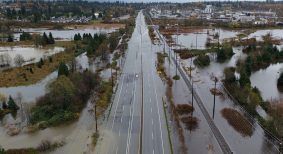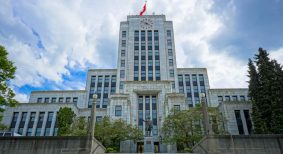For construction employers considering implementing COVID vaccine mandates, the key consideration is whether or not there is a compelling reason to implement the policy.
“It’s not whether another company that you know did it, whether the B.C. or federal government has done it — it’s whether if it makes sense for your company,” said Melanie Vipond, a partner with law firm Gall Legge Grant Zwack LLP and an expert in labour issues.
She was one of several industry experts gathered to discuss COVID best practices and vaccine mandates during a virtual event hosted by the Vancouver Regional Construction Association (VRCA)
Vipond cited a valid reason to implement a vaccine mandate could be because of site requirements for vaccinated workers by owners like the B.C. government or B.C. Hydro. A timeframe for the policy and evidence of why the policy is necessary (eg. prior outbreaks, high risk project) are also important to keep in mind.
“What’s reasonable now may not be reasonable six months from now. You want to be regularly reviewing it to see if it still needs to be in place,” advised Vipond, adding companies can look at whether less intrusive measures can achieve the same safety objectives.
Giving sufficient notice to workers to comply by the new policy and the consequences if they don’t are also important, along with having a process for addressing those who believe they have an exemption.
Tim Coldwell, president of Chandos Construction, said a reason his company implemented mandatory vaccination was the movement of crews across their 125 active sites in Canada. With the federal government vaccination policy for air travel, the decision for a vaccine mandate made sense and the company gave workers a two month notice.
“We worked hard on not being divisive about it with our internal language and framing,” said Coldwell. “We got paid professional coaches and medical professionals to speak with those who were vaccine hesitant and had our legal team meet individually with folks.”
The process used on sites is to inspect vaccine cards or scan QR codes. Coldwell says compliance has been roughly 99 per cent from their 600 employees including craft workers with no legal issues.
“Lots of people got wrapped around the axle on fear of losing good people over this. We’ve gained great people who came to us because they wanted to work for an employer with a mandate,” he said.
Sheri Kashman, principal consultant Jouta HR Consulting, agreed with many of Vipond’s advice noting it is not a one-size-fits-all approach. She advised companies to find what works for them and see how a policy would align with their culture, practices and attraction/retention.
“Be sure you’re clear on the reasons why you’re doing it – be sure that it’s fair and equitable,” she said.
Dave Baspaly, president of the Council of Construction Associations, called the pandemic a “once in a lifetime crisis” in which the construction industry has thrived as an essential service.
“If you’ve done everything right and people are safe you’re at the end game,” he said.
Best practices established through COVID plans are working to keep the industry safe but moving forward, Basplay said access to rapid testing needs to be better and is a critical part of the toolbox against COVID.
“We have a rapidly moving and transient workforce, we work in multiple context, our sub-trades move around throughout our industry – we need to have some mechanism to quickly test that’s not cost prohibitive,” he said.
Cheryl Mah is managing editor of Construction Business.









